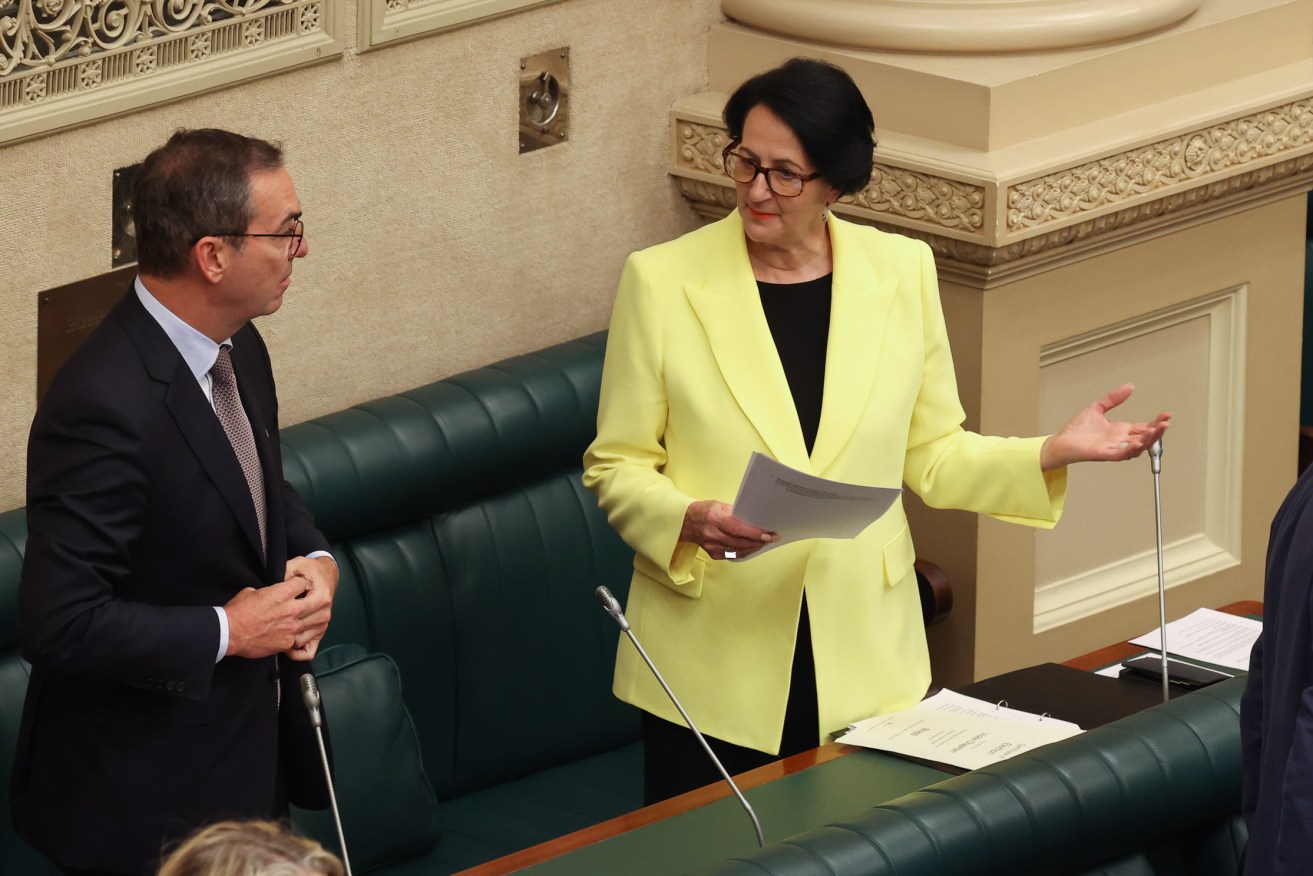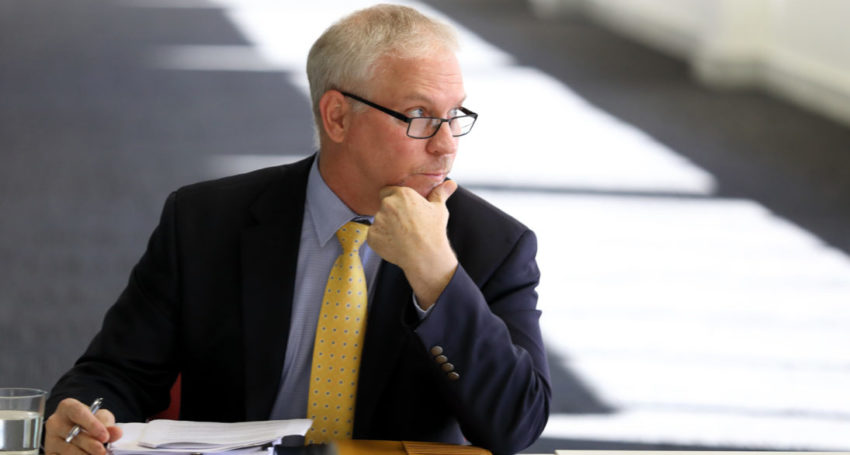Chapman ‘hard done-by’ on conflict finding, says Ombudsman
Proponents of a timber port on Kangaroo Island could have raised concerns about a potential apprehension of bias by then-Attorney-General Vickie Chapman, the Ombudsman who cleared her says – but argues she was “hard-done-by” on the question of conflict of interest.

Vickie Chapman with former Premier Steven Marshall in parliament yesterday. Photo: Tony Lewis / InDaily
Ombudsman Wayne Lines yesterday handed down his long-awaited report, which cleared Chapman of real, perceived or potential conflicts of interest – an outcome completely at odds with last year’s parliamentary inquiry and the summary statements of its QC, Dr Rachael Gray.
Chapman, who is bowing out of parliament this month and remains in a standoff as to whether she has already resigned, lost a vote of no confidence in the House of Assembly last year after the committee’s report, which also found she had misled parliament about her land holdings on her native Kangaroo Island.
Lines told InDaily today he understood “how the committee approached it”, saying: “They were looking at more than conflict of interest [such as] misleading statements in parliament.”
“But I guess on the conflict of interest issue, there were assumptions in the heat of the moment and the urgency of the matter that I think have led to a wrong conclusion,” he said.
“It follows then that I’d say she’s hard-done-by on that issue.”
While his report criticised the committee for its referral to him of matters on which it had already adjudicated – suggesting it had the potential to compromise the independence of his office – Lines was more circumspect today when asked why his conclusions had been so different to that inquiry’s.
“Part of it is that the committee had been set a very short timeline to complete their inquiry and produce their report – they had six weeks to do it – while I’ve had the luxury of taking six months to reach my conclusion,” he said.
“I haven’t had to be subject to public opinion – I’ve done my investigation in private.”
He said he “also had the opportunity to go across to Kangaroo Island and have a look at where things are, and how they’re positioned geographically… what roads look like, what the property looks like and all of that.
“I think that’s been an advantage for me.”
He said his report was “not supposed to be a critique of the select committee’s inquiry” – which the Liberal Opposition is today hammering, demanding the Government reveal what the committee cost.
“It’s a different process, and my approach was different,” Lines said.

SA Ombudsman Wayne Lines. Photo: Tony Lewis / InDaily
“I focussed very much on identifying the nature of Ms Chapman’s interests, because that’s what you have to work out to determine whether there’s a conflict of interest – in what way would the outcome of the decision she had before her affect her interests? You need to know what those interests are, and my conclusion was that because she doesn’t live there [on KI], really you have to say what information is there about the application that would impact upon her property, either in saleability, leasability or her ability to agist stock on it.”
He said the impact of the port, including the movement of trucks from forestry plantations, “would have no impact on the value of the property”.
He agreed that conflicts of interest can include factors “broader than commercial”, including lifestyle and “the enjoyability of the property”, but “that kind of thing has less reliance”.
Asked if that meant that non-residential property adjacent to major developments could not give rise to conflicts of interest, he said: “It does depend on the nature of the development, and what impact it would have on that property.”
“Let’s say the activities around the property would disrupt access to it – that would be a relevant issue and may well create a conflict… but just purely because they’ve got a property in the vicinity of the development isn’t of itself going to create a conflict.”
Lines also dismissed a major element of concern raised in the inquiry by former executives of the port’s proponent, Kangaroo island Plantation Timbers, who alleged Chapman had privately dismissed the location of the port as early as 2017, when she was in Opposition.
“I didn’t think that created a private interest – I think if anything that might have caused them a concern about a bias,” he said.
“But you’ve got to bear in mind, that discussion occurred three to four years before the final decision – not at a time when she had any power to make any decision… the detail of the development application hadn’t been completed, there was no environmental impact statement at that time – it was just a broad proposal.”
Asked if the proponents could have been concerned when an MP who had expressed such reservations was later handed sole responsibility for green-lighting the project, Lines said: “Oh yes – but in terms of a concept of a conflict of interest, her involvement didn’t create a private interest that would be in conflict with the application.”
“It may have been a reason for the KIPT directors to be concerned about whether she had a bias – but they didn’t raise that with her,” he said.
“That’s a bit of a difference between a conflict of interest which the minister had to declare and an apprehension of bias they needed to raise with her, because the methods of raising it is different.”
Witnesses to the committee had suggested they did not raise those concerns because they feared the impact on the project if they did so, but Lines says that scenario “was sort of overstated”.
“The proponents knew that there were alternatives to the minister… if they had a genuine concern about Ms Chapman determining it they could have easily raised that with her, and she would have known it would be in the best interests of governance to step aside,” Lines said.
“That concern about being victimised has been overstated.”
Despite the non-Liberal members of the inquiry finding both a real and perceived conflict, Lines insists the latter does not apply “because the concept of a perceived conflict of interest is not based on impressions”.
“It’s based on what a reasonable and fair-minded observer would perceive based on actual information and evidence,” he said.
“When I put myself in the position of that reasonable and fair-minded observer, I was able to take into account all the information that was in the public arena, and what we knew about Ms Chapman’s property interests and living situation…
“When I did that I came to the conclusion that even though it looked like she might have been putting the property up for a tourism accommodation, the detail of the development application wasn’t suggesting there would be an impact on tourist accommodation being available and carrying in as normal.”
He said a perceived conflict of interest “isn’t just about what it looks like from a distance”.
“It’s more involved – it’s that objective reasonable observer who has looked at all the information,” he said.




